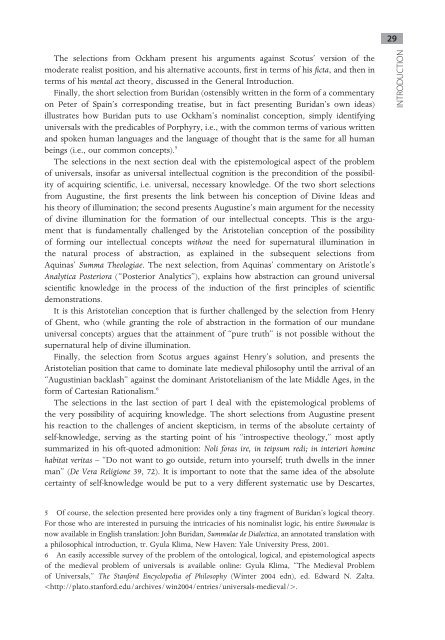Blackwell Readings in Medieval Philosophy - Fordham University ...
Blackwell Readings in Medieval Philosophy - Fordham University ...
Blackwell Readings in Medieval Philosophy - Fordham University ...
You also want an ePaper? Increase the reach of your titles
YUMPU automatically turns print PDFs into web optimized ePapers that Google loves.
MP_C01.qxd 11/17/06 5:27 PM Page 29<br />
The selections from Ockham present his arguments aga<strong>in</strong>st Scotus’ version of the<br />
moderate realist position, and his alternative accounts, first <strong>in</strong> terms of his ficta, and then <strong>in</strong><br />
terms of his mental act theory, discussed <strong>in</strong> the General Introduction.<br />
F<strong>in</strong>ally, the short selection from Buridan (ostensibly written <strong>in</strong> the form of a commentary<br />
on Peter of Spa<strong>in</strong>’s correspond<strong>in</strong>g treatise, but <strong>in</strong> fact present<strong>in</strong>g Buridan’s own ideas)<br />
illustrates how Buridan puts to use Ockham’s nom<strong>in</strong>alist conception, simply identify<strong>in</strong>g<br />
universals with the predicables of Porphyry, i.e., with the common terms of various written<br />
and spoken human languages and the language of thought that is the same for all human<br />
be<strong>in</strong>gs (i.e., our common concepts). 5<br />
The selections <strong>in</strong> the next section deal with the epistemological aspect of the problem<br />
of universals, <strong>in</strong>sofar as universal <strong>in</strong>tellectual cognition is the precondition of the possibility<br />
of acquir<strong>in</strong>g scientific, i.e. universal, necessary knowledge. Of the two short selections<br />
from August<strong>in</strong>e, the first presents the l<strong>in</strong>k between his conception of Div<strong>in</strong>e Ideas and<br />
his theory of illum<strong>in</strong>ation; the second presents August<strong>in</strong>e’s ma<strong>in</strong> argument for the necessity<br />
of div<strong>in</strong>e illum<strong>in</strong>ation for the formation of our <strong>in</strong>tellectual concepts. This is the argument<br />
that is fundamentally challenged by the Aristotelian conception of the possibility<br />
of form<strong>in</strong>g our <strong>in</strong>tellectual concepts without the need for supernatural illum<strong>in</strong>ation <strong>in</strong><br />
the natural process of abstraction, as expla<strong>in</strong>ed <strong>in</strong> the subsequent selections from<br />
Aqu<strong>in</strong>as’ Summa Theologiae. The next selection, from Aqu<strong>in</strong>as’ commentary on Aristotle’s<br />
Analytica Posteriora (“Posterior Analytics”), expla<strong>in</strong>s how abstraction can ground universal<br />
scientific knowledge <strong>in</strong> the process of the <strong>in</strong>duction of the first pr<strong>in</strong>ciples of scientific<br />
demonstrations.<br />
It is this Aristotelian conception that is further challenged by the selection from Henry<br />
of Ghent, who (while grant<strong>in</strong>g the role of abstraction <strong>in</strong> the formation of our mundane<br />
universal concepts) argues that the atta<strong>in</strong>ment of “pure truth” is not possible without the<br />
supernatural help of div<strong>in</strong>e illum<strong>in</strong>ation.<br />
F<strong>in</strong>ally, the selection from Scotus argues aga<strong>in</strong>st Henry’s solution, and presents the<br />
Aristotelian position that came to dom<strong>in</strong>ate late medieval philosophy until the arrival of an<br />
“August<strong>in</strong>ian backlash” aga<strong>in</strong>st the dom<strong>in</strong>ant Aristotelianism of the late Middle Ages, <strong>in</strong> the<br />
form of Cartesian Rationalism. 6<br />
The selections <strong>in</strong> the last section of part I deal with the epistemological problems of<br />
the very possibility of acquir<strong>in</strong>g knowledge. The short selections from August<strong>in</strong>e present<br />
his reaction to the challenges of ancient skepticism, <strong>in</strong> terms of the absolute certa<strong>in</strong>ty of<br />
self-knowledge, serv<strong>in</strong>g as the start<strong>in</strong>g po<strong>in</strong>t of his “<strong>in</strong>trospective theology,” most aptly<br />
summarized <strong>in</strong> his oft-quoted admonition: Noli foras ire, <strong>in</strong> teipsum redi; <strong>in</strong> <strong>in</strong>teriori hom<strong>in</strong>e<br />
habitat veritas – “Do not want to go outside, return <strong>in</strong>to yourself; truth dwells <strong>in</strong> the <strong>in</strong>ner<br />
man” (De Vera Religione 39, 72). It is important to note that the same idea of the absolute<br />
certa<strong>in</strong>ty of self-knowledge would be put to a very different systematic use by Descartes,<br />
5 Of course, the selection presented here provides only a t<strong>in</strong>y fragment of Buridan’s logical theory.<br />
For those who are <strong>in</strong>terested <strong>in</strong> pursu<strong>in</strong>g the <strong>in</strong>tricacies of his nom<strong>in</strong>alist logic, his entire Summulae is<br />
now available <strong>in</strong> English translation: John Buridan, Summulae de Dialectica, an annotated translation with<br />
a philosophical <strong>in</strong>troduction, tr. Gyula Klima, New Haven: Yale <strong>University</strong> Press, 2001.<br />
6 An easily accessible survey of the problem of the ontological, logical, and epistemological aspects<br />
of the medieval problem of universals is available onl<strong>in</strong>e: Gyula Klima, “The <strong>Medieval</strong> Problem<br />
of Universals,” The Stanford Encyclopedia of <strong>Philosophy</strong> (W<strong>in</strong>ter 2004 edn), ed. Edward N. Zalta.<br />
.<br />
29<br />
INTRODUCTION

















